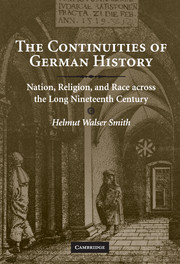Book contents
- Frontmatter
- Contents
- Introduction
- 1 The Vanishing Point of German History
- 2 The Mirror Turn Lamp: Senses of the Nation before Nationalism
- 3 On Catastrophic Religious Violence and National Belonging: The Thirty Years War and the Massacre of Jews in Social Memory
- 4 From Play to Act: Anti-Jewish Violence in German and European History during the Long Nineteenth Century
- 5 Eliminationist Racism
- Conclusion: Continuities in German History
- Acknowledgments
- Index
Conclusion: Continuities in German History
Published online by Cambridge University Press: 05 June 2012
- Frontmatter
- Contents
- Introduction
- 1 The Vanishing Point of German History
- 2 The Mirror Turn Lamp: Senses of the Nation before Nationalism
- 3 On Catastrophic Religious Violence and National Belonging: The Thirty Years War and the Massacre of Jews in Social Memory
- 4 From Play to Act: Anti-Jewish Violence in German and European History during the Long Nineteenth Century
- 5 Eliminationist Racism
- Conclusion: Continuities in German History
- Acknowledgments
- Index
Summary
“It is not the eighteenth but the nineteenth century that stands between Lessing and us.”
Hannah ArendtWhat was lost in the nineteenth century, according to Hannah Arendt, was a form of human solidarity. In Men in Dark Times, Arendt has Lessing stand neither for reason nor for tolerance, but for compassion, and not for the egalitarian compassion of fraternity, but for the selective compassion of friendship. The political relevance of this point becomes evident when we consider what, for Arendt, was the antithesis of friendship, namely cruelty. When higher and more powerful ideas held sway – whether the inexorable progress of history, the natural egoism of nations, the necessity of creating a more perfect society, or even the imperative of logical non-contradiction – more limited commitments, requiring discrete acts of courage, diminished. Cruelty then became thinkable. More precisely, it became a reality in the nexus between thought and act. Arendt illustrates the argument with Germans and Jews in the Third Reich. The antithesis to Nazi policies, she insisted, was not to say “are we not both human beings?” but to say, to each other, “Germans and Jews, friends.” The first response constituted a cosmopolitan appeal to universals; it ignored what, in fact, had transpired by the time of the Nuremberg Laws. The second response demanded a counter-assertion of ties to one's neighbor and a refusal to concede the Nazi state's severance of human solidarities.
- Type
- Chapter
- Information
- The Continuities of German HistoryNation, Religion, and Race across the Long Nineteenth Century, pp. 211 - 234Publisher: Cambridge University PressPrint publication year: 2008

